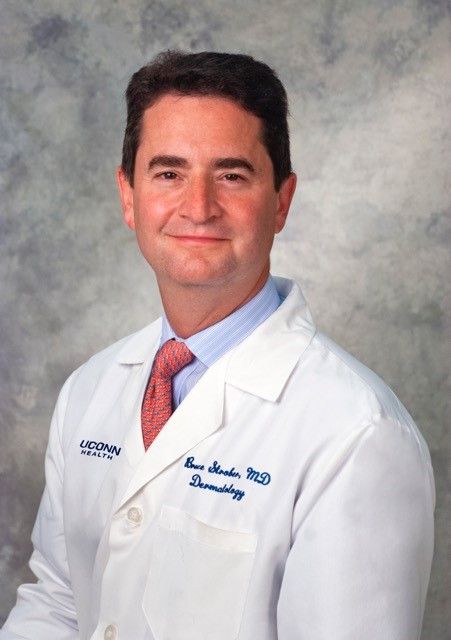- Case-Based Roundtable
- General Dermatology
- Eczema
- Chronic Hand Eczema
- Alopecia
- Aesthetics
- Vitiligo
- COVID-19
- Actinic Keratosis
- Precision Medicine and Biologics
- Rare Disease
- Wound Care
- Rosacea
- Psoriasis
- Psoriatic Arthritis
- Atopic Dermatitis
- Melasma
- NP and PA
- Skin Cancer
- Hidradenitis Suppurativa
- Drug Watch
- Pigmentary Disorders
- Acne
- Pediatric Dermatology
- Practice Management
- Prurigo Nodularis
- Buy-and-Bill
Publication
Article
Dermatology Times
IL-36 Inhibitors on the Horizon for Generalized Pustular Psoriasis
Author(s):
Thanks to targeted drugs in early-stage development, patients with generalized pustular psoriasis (GPP) will one day likely have FDA-approved treatments for the disease, according to one expert.
Thanks to targeted drugs in early-stage development, patients with generalized pustular psoriasis (GPP) will one day likely have FDA-approved treatments for the disease, said Bruce Strober, MD, PhD, in his presentation at the Symposium for Inflammatory Skin Disease in April 2021.1 These new therapies will likely be safer and easier to access than current off-label options, he added.
“Generalized pustular psoriasis is becoming of greater interest because there are drugs recently approved for use in Asian countries, such as interleukin (IL)-23 inhibitors, as well as biologics, imsidolimab and spesolimab, being specifically developed for generalized pustular psoriasis. They particularly involve direct inhibition of the IL-36 receptor (IL-36R),” said Strober, cofounder of Central Connecticut Dermatology in Cromwell and clinical professor of dermatology at Yale School of Medicine in New Haven, Connecticut.
Bruce Strober, MD, PhD

In a phase 2 trial, 6 of 8 patients given subcutaneous imsidolimab every 4 weeks achieved the primary end point of improvement in a clinical global impression scale on day 29. Pustule counts declined by an average of 60% on day 8 and 94% by day 29.2
In a phase 1 study, 5 of 7 patients with moderately to severe flaring GPP who received a single dose of intravenous spesolimab achieved Physician Global Assessment scores of 0 or 1 (clear or almost clear) within 1 week. Within 4 weeks, all patients had achieved similar success3 and the drugs were both well tolerated.
Going forward, Strober predicts that imsidolimab’s safety and efficacy data will corroborate that of spesolimab, and vice versa. “They’re both going to work for the condition,” he said. “And when you have 2 different companies developing the same kind of drug and obtaining similar data, it establishes firmly that the target IL-36 receptor is very important in the pathophysiology of the disease,” he said, adding that in his opinion, the drugs’ rapid onset of action is impressive.
It remains to be seen how the IL-36 inhibitors will compare to biologics currently used for GPP, Strober said. “But the bottom line is, in a few years, patients with GPP will have FDA-approved therapies, not off-label therapies, that are covered by insurance and therefore easily deliverable to patients. That’s a critical difference.”
Spesolimab will likely be an intravenous drug initially, with a subcutaneous formulation being developed subsequently, he said, adding that because few dermatologists provide intravenous infusions, he is more interested in a subcutaneous formulation.
For now, the spesolimab and imsidolimab studies provide preliminary evidence supporting the safety and efficacy of IL-36R inhibition in treating GPP flares. Research has shown that dysregulation of the IL-36 pathway is, if not all, then a large percentage of GPP cases.4,5 Specifically, mutations in IL36RN lead to functional impairment of IL-36R, enhancing the downstream inflammatory cascade.
“Generalized pustular psoriasis could be viewed as a rare, angrier variant of psoriasis,” Strober said.
The pathophysiologies underpinning psoriasis and GPP seem to overlap, but they differ somewhat. Along with IL-36, he explained, both GPP and plaque psoriasis lesions overexpress IL-17A, TNF alpha, IL-1, and interferons.
“The cytokines that are relevant to plaque psoriasis often are at play in generalized pustular psoriasis,” Strober said. “But maybe generalized pustular psoriasis relies more heavily upon the IL-36 pathway, whereas plaque psoriasis is more reliant on IL-17.”4,5
In some patients, GPP evolves out of plaque psoriasis; GPP also can exist without pre-existing plaque psoriasis. “There are multiple kinds of presentations—infrequent flares, or the flares can be frequent and persistent, such that the patient is always wrestling with a very severe form of psoriasis that requires consistent maintenance of therapy,” he said.
Severe GPP can bring debilitating symptoms including diffuse sterile pustules, significant skin pain, and systemic complaints such as fever, fatigue, and metabolic abnormalities. Lymphocytosis is often involved. Patients also can experience cardiovascular complications and multisystem organ failure. Additionally, the comorbidities associated with psoriasis tend to occur more frequently with GPP.6
Currently FDA-approved biologic therapies including TNF alpha inhibitors, IL-23 inhibitors, and IL-17 inhibitors can show improvement for some patients with GPP, Strober said. He recently treated 2 patients over 60, both of whom cleared in less than 2 weeks with secukinumab and ixekizumab, respectively. The age of these patients and their concomitant comorbidities steered Strober toward biologic therapy.
Cyclosporine can work as quickly as IL-17 inhibitors in GPP, Strober explained. In a survey he coauthored with 29 dermatologists, 64% of respondents said they are very likely to prescribe cyclosporine for GPP flares.7 “The problem with cyclosporine is that it’s laden with toxicities that we don’t need to countenance in the age of biologic therapies that are just as effective,” Strober said.
“I believe that IL-17 inhibitors and biologics in general are safer drugs across all age groups, but especially in older patients who might have comorbidities,” he said. “I prefer to use a drug that has no organ toxicity, doesn’t affect metabolic issues, and doesn’t require liver tests or renal function measurements.” For such reasons, he says, the future of GPP therapy increasingly will involve biologics.
Disclosures:
Strober has been a consultant, advisory board member, investigator, and speaker for AbbVie. Additionally, he has been a consultant, adviser, and speaker for Amgen, Dermavant, Eli Lilly and Company, Janssen Pharmaceuticals, Novartis, and Sanofi Genzyme. He has been a consultant and adviser for Almirall, Arcutis, Arena, Aristea, Asana, Boehringer Ingelheim, Immunic, Bristol Myers Squibb, Connect Biopharma, Equillium, LEO, Maruho, Meiji Seika Pharma, Mindera, Pfizer, GlaxoSmithKline, UCB Pharma, Sun Pharma, Ortho Dermatologics, and Regeneron. He has been an investigator and coscientific director of the CorEvitas (formerly Corrona) Psoriasis Registry and an investigator for Cara Therapeutics and Dermira.
References:
1. Strober BE. Generalized pustular psoriasis. Presented at: Symposium for Inflammatory Skin Disease; April 10, 2021. Accessed April 8, 2021.
2. AnaptysBio reports positive topline data from GALLOP phase 2 clinical trial of imsidolimab in moderate-to-severe generalized pustular psoriasis (GPP). AnaptysBio. News release. October 13, 2020. Accessed April 8, 2021. https://ir.anaptysbio.com/news-releases/news-release-details/anaptysbio-reports-positive-topline-data-gallop-phase-2-clinical
3. Bachelez H. Efficacy and safety of BI 655130, an anti–interleukin-36 receptor antibody, in patients with acute generalized pustular psoriasis. Presented at: European Academy of Dermatology and Venereology Annual Congress; September 15, 2018; Paris. Accessed April 8, 2021. Abstract D3T01.1E.
4. Hawkes JE, Chan TC, Krueger JG. Psoriasis pathogenesis and the development of novel targeted immune therapies. J Allergy Clin Immunol. 2017;140(3):645-653. doi:10.1016/j.jaci.2017.07.004
5. Gooderham MJ, Van Voorhees AS, Lebwohl MG. An update on generalized pustular psoriasis. Expert Rev Clin Immunol. 2019;15(9):907-919. doi:10.1080/1744666X.2019.1648209
6. Strober BE, Kotowsky N, Medeiros RA, et al. Patient-reported outcomes from a large, North American-based cohort highlight a greater disease burden for generalized pustular psoriasis versus plaque psoriasis: real-world evidence from the Corrona Psoriasis Registry. Presented at: American Academy of Dermatology VMX. April 23-25, 2021. Poster P26588.
7. Strober BE, Lebwohl M, Kotowsky N, et al. Perspectives on generalized pustular psoriasis treatment in North America: survey results from dermatologists in the Corrona Psoriasis Registry. Presented at: European Academy of Dermatology and Venereology Annual Congress; October 29, 2020. Poster P0749.






